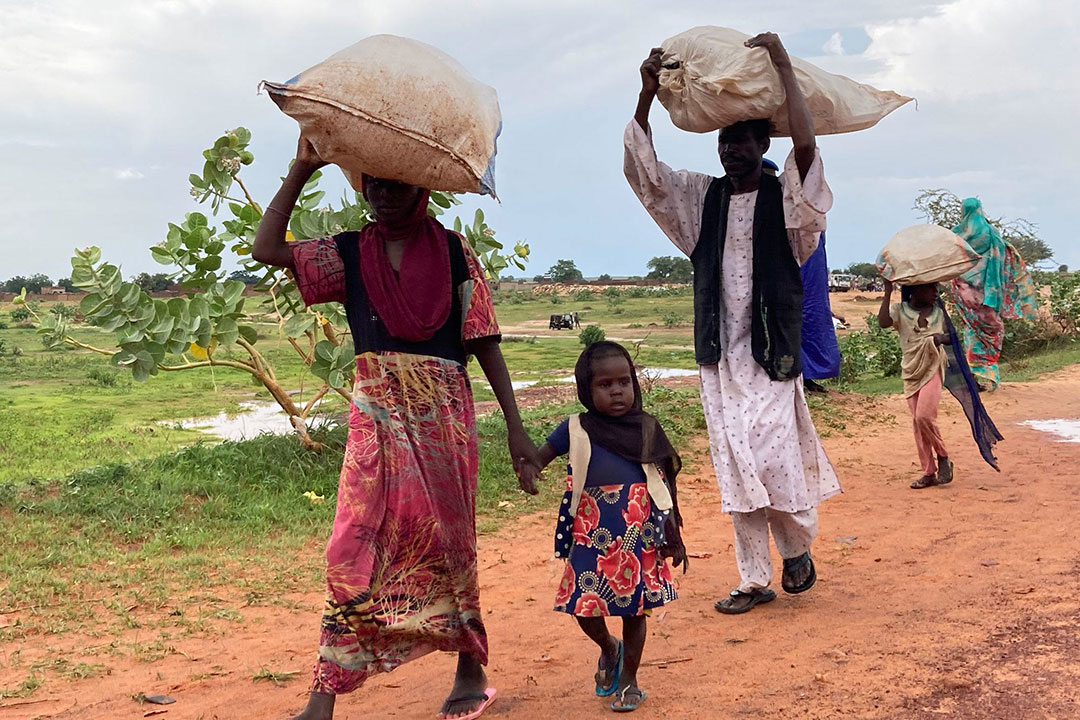RSF Using Food as Weapon to Forcibly Conscript Fighters
ADF STAFF
Amid desperate warnings of impending famine across Sudan, the paramilitary Rapid Support Forces (RSF) continues to use hunger as a weapon of war.
The yearlong conflict has caused the deaths of more than 12,000 people and the displacement of an estimated 8.3 million. According to the United Nations, 5 million people in Sudan are at risk of “catastrophic” hunger, and more than 18 million are dealing with acute levels of hunger.
The RSF has routinely used food and hunger as tools to control civilians. Now it is using those tools to force men and boys in Al Jazira State to join their fight against Sudan’s military.
In mid-December, the militia first entered Jazira, the country’s agricultural center, about 180 kilometers south of Khartoum, taking control after the army had withdrawn.
The RSF reportedly has attacked civilians, looted homes, stolen cars, seized land and overwhelmed entire communities. Its initial goals were to take food and supplies, but the RSF quickly seized the country’s primary food production apparatuses.
Experts say the consequences will be dire.
“There is no other way around what’s about to happen in Sudan,” the Norwegian Refugee Council’s Sudan director William Carter told Agence France-Presse. “Unless peace magically descends on Sudan, there is going to be famine. At this point, it’s not just air strikes and urban warfare killing people.”
A recent CNN investigation found that the RSF forcibly recruited nearly 700 men and 65 children as part of its rampage through Jazira State between January and March. Witnesses said the RSF used torture, executions, threats against their families, and the withholding of food and medical aid.
The cable network broadcast cellphone videos from villagers who described a January attack in which the RSF executed six men who had refused to enlist.
On February 27, the militia swept into a different village to recruit 20 young men. When they refused, the RSF looted and burned homes, markets and food warehouses.
Witnesses also detailed how new RSF recruits were “rewarded with food and aid looted from others.”
Mohamed Badawi, a lawyer with the African Center for Justice and Peace Studies, told CNN that the RSF’s tactics were akin to an “enforced labor system.”
“People need to survive,” he said. “They have no other choice, no one to complain to. If you don’t kill for them, you will be arrested.”
On January 18, the RSF broke into the headquarters of the Jazira Scheme, one of the largest irrigation projects in the world. Omar Marzoug, governor of the Jazira Scheme undertaking, sent a list to the Sudanese government of everything they stole — tractors, seeds, fertilizer and warehouses loaded with food.
“Whoever controls Jazira, controls the food production in the country,” Horn of Africa expert Alex de Waal told CNN.
Both of the warring sides in the conflict have been accused of obstructing or refusing to facilitate relief efforts, and experts say the epidemic of widespread hunger is worsening.
“An unprecedented surge in the treatment of severe wasting, the most lethal manifestation of malnutrition, is already being observed in accessible areas,” United Nations aid chief Martin Griffiths wrote in a March 15 note to the U.N. Security Council.
Sudan saw the worst hunger level ever recorded during its October-February harvest season, according to a February report by the Clingendael Institute, an independent think tank.
Researcher Anette Hoffmann, who wrote the Clingendael report, said the severity and scale of hunger in the coming lean season in mid-2024 will be “catastrophic.”
She blamed the RSF for blocking farmers from their harvests and putting about 7 million people at risk of “mass starvation” by June.
“This harvest was badly needed to compensate for the massive production losses that already occurred due to the fighting in other states,” she told CNN. “The RSF’s violent advances in Jazira State, their targeted destruction of warehouses, Sudan’s gene bank and irrigation systems will inevitably further exacerbate Sudan’s massive food shortages.
“Those hampering life-saving aid must be held responsible for the famine they cause.”


Comments are closed.